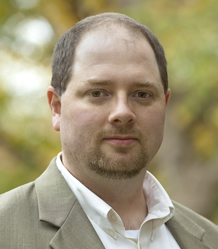Instead of transitioning straight from an undergraduate to a PhD program, Erik Nisbet decided to first build some professional experiences in research, strategic marketing, and branding.
He joined the workforce in the late 1990s, conducting national marketing/brand management work for a corporate apparel company, as well as tracking and reporting on lodging supply data as a director of strategic market research.
After spending seven years developing his skills, Nisbet then worked for Cornell University as a senior research associate before earning his PhD in Communication and Comparative Politics. From there, he joined Ohio State faculty to teach undergraduate and graduate-level communications courses.
Now he’s adding a new role to his repertoire: Nisbet is the new faculty director for the MS in Communication (MSC) program. He came to Northwestern University a year ago as an Owen L. Coon Endowed Professor for the School of Communication’s Center for Communication & Public Policy.
“I do a lot of research that informs strategic communication,” he explains. “I focus on message design, the impact of message framing, and the impact of different types of media sources on public opinion and policy attitudes around certain issues. I’m combining that work with my professional experiences to help create a professional MSC program that is intellectually rigorous yet provides skills, principles, knowledge, and career coaching to help students.”
His plan is to build on the program’s solid foundation and three core curricular themes—complexity management, collaborative leadership, and communication—to make sure students get more than just a degree.
“We’re creating leaders and managers in communication and giving them tools so they can transform their own organizations. They will be able to find their place and customize the program to suit their needs.”
Nisbet says his goal isn’t to teach—it’s to transform. The program goes far beyond classwork, offering co-curricular activities, personalized career coaching, cohort collaboration projects, and interactions with a robust alumni network (which he plans to expand in the future).
“We’re creating leaders and managers in communication and giving them tools so they can transform their own organizations. We want students to also be able to communicate their personal brands in a global marketplace and the complex cultural environment we’re in,” he explains. “They will be able to find their place and customize the program to suit their needs.”
He sees his strengths as complements to those of other faculty, with a strong emphasis on communication: how to find audiences, how to connect with them, how to understand them, and which messages work best for them.
Nisbet will share his expertise as he leads Foundations of Strategic Management in the program’s spring quarter; he says one of the things he looks forward to most is engaging with students during that process. His teaching will focus on helping them create comprehensive marketing and branding initiatives for organizations while balancing and working with internal and external stakeholders.
In addition to serving as the program’s faculty director, Nisbet will continue his role with the Center for Communication & Public Policy, as well as teaching domestic and international workshops for the USC Annenberg Center on Public Diplomacy.
He’ll also continue to serve as a trusted source for local and national media as they report on public opinion and perceptions about public policy issues, such as COVID-19 vaccines and presidential races.
“I’m excited to work with students who are interested in leadership and management, as well as those who have strong interests in strategic communication, and provide more pedagogical pathways for them.”